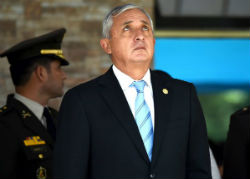Guatemala’s Congress has voted to lift President Otto Perez Molina’s political immunity, opening the door for prosecutors to bring criminal charges against the president for his alleged role in a massive customs fraud ring and entering into the unknown.
On September 1, all 132 members of Congress present voted for withdrawing Perez Molina’s immunity, reported Reuters, including numerous members of Perez Molina’s own Patriotic Party and that of his political ally, Lider.
The vote led to celebrations in the rainy streets of Guatemala City, as thousands had gathered in front of Congress to see the process to its dramatic conclusion following weeks of protests against the president.
The decision comes little more than one week after Guatemala’s Attorney General’s Office and the UN-backed anti-impunity body CICIG accused Perez Molina of running a massive fraud network within the country’s customs agency, known as “La Linea.” On August 29, a congressional committee recommended stripping the president of his immunity.
The investigation into La Linea has already led to the resignation and arrest of former Vice President Roxana Baldetti. Both Baldetti and Perez Molina have denied the charges against them.
SEE ALSO: Coverage of Elites and Organized Crime
When the scandal broke in April, prosecutors listed Baldetti’s then-private secretary, Juan Carlos Monzon, as the head of La Linea. However, in August officials said intercepted phone conversations between La Linea operators referring to “number one” and “number two” were most likely alluding to the president and vice-president.
A previous bid to remove the president’s immunity failed in mid-August when congress was unable to garner the required votes. Perez Molina’s term officially ends in January 2016, but he could be in jail by the end of the week. Attorney General Thelma Aldana said the president cannot leave the country, and a judge will decide whether to incarcerate him while the investigation proceeds. Aldana may be seeking to prevent a situation similar to what occurred in Panama, where former President Ricardo Martinelli fled the country in January, shortly before the Supreme Court greenlit an investigation against him for corruption charges.
InSight Crime Analysis
Guatemala is now in unscripted territory. Perez Molina was the first Guatemalan president ever to be stripped of his immunity. If he is arrested, Vice President Alejandro Maldonado becomes president. Maldonado has only been Vice President since May when Baldetti resigned.
The decision also throws the September 6 general elections into question. Depending on how quickly prosecutors bring charges against Perez Molina, this may lead to a postponement of those elections.
For this reason, there were fears that members of Lider party would vote against stripping Perez Molina of his immunity, since their presidential nominee, Manuel Baldizon, is currently the frontrunner. Pushing back the election to a later date could jeopardize Baldizon’s advantage in a close race in which no candidate is expected to win enough votes to prevent a run-off election in late October.
But it appears the fear of voter backlash outweighed whatever ground Lider might lose if this weekend’s election is postponed. Perez Molina has been facing intense pressure to step down for months. On August 27, an estimated 100,000 protesters filled Guatemala City’s Constitution Plaza to demand the president’s resignation. Notably, this public outrage has come from all sectors of Guatemalan society.
SEE ALSO: Guatemala News and Profiles
It is not clear how this public mobilization will impact elections. The apparent frontrunner Lider Party appears to be banking on the election taking place, and it surely expects to get a boost in voter approval following the recent action against the president and the votes of Lider congressional representatives against the president on September 1.
However, the upheaval may also lead to a surprising turnout of voters who just a few weeks ago were disaffected. Their vote may determine the outcome.
Amidst it all is the dramatic fall of what was once thought of as a “law and order” president. Since prosecutors implicated the president in the customs fraud scandal, the former military general has become increasingly isolated. Shortly after the announcement, several of Perez Molina’s cabinet ministers resigned, and Guatemala’s most powerful business association, known by its acronym CACIF, joined the growing chorus of voices calling for the president to resign.
In response, on August 22, Perez Molina reportedly met with Baldizon in order to strengthen the alliance between Lider and Patriotic Party. The president also reportedly held a meeting with Mario Lopez, head of the giant mobile phone service provider Tigo, and named two of Lopez’s close associates to influential positions within the government.
Perez Molina’s last-ditch efforts to build allies failed to save him from facing what appear to be imminent criminal charges. Given the high level of influence politicians wield over Guatemala’s courts, there is no guarantee that a probe into Perez Molina would lead to a conviction. But it certainly seems as if the traditional way of building impunity in Guatemala through backdoor deals and connections to business elites is starting to break down.

